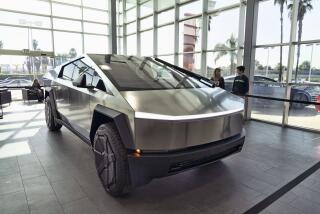Consumer Reports cuts Camry, RAV4, Prius V from recommended list

Consumer Reports no longer recommends three of Toyota¿s most popular vehicles in its annual reliability ranking.
- Share via
Consumer Reports dumped some its favorite vehicles -- Toyota’s Camry, RAV4 and Prius V -- from its list of recommended cars Monday because the vehicles scored poorly in an insurance industry crash test.
The influential magazine said it looked at the results of what is known as the small overlap crash test in making the decision to revoke its endorsement for the vehicles. The Camry is the bestselling passenger car in the United States, and the RAV4 is one of the most popular compact sport utilities.
All three have long been among Consumer Reports’ top picks. Audi’s A4 also lost its recommended status for the same reason.
“Now that more than 50 vehicles have gone through that test, our engineers feel we cannot recommend a vehicle that has a poor safety rating on a crash test,” said C. Matt Fields, a Consumer Reports spokesman. “Those four have been tested and retested, and they don’t score well.”
Car shoppers should look at the Consumer Reports recommended models that are competitive with the Toyota vehicles and have better crash-test results, the magazine said.
The small overlap crash test -- in which 25% of a car’s front end on the driver’s side strikes a 5-foot-tall rigid barrier at 40 mph -- simulates a wreck in which the front corner of the car hits another car or a solid object. The Insurance Institute for Highway Safety, an industry group, established the test because front corner crashes can be particularly severe.
“With the small over-lap test, the Institute has raised the bar again, and we are responding to the challenge,” Toyota said in a statement. “We are looking at a range of solutions to achieve greater crash performance in this area.”
The loss of Consumer Reports’ endorsement could hurt sales of the cars, said Jack Nerad, an analyst with auto information company Kelley Blue Book.
“Those people who buy Toyotas have a propensity for following Consumer Reports,” he said.
Nerad said the move also was significant because it involves some of Toyota’s biggest sellers and gives prominence to a crash test that is not required by the federal National Highway Traffic Safety Administration.
It makes sense for the insurance group to crash-test cars, Nerad said.
“There is valuable lifesaving data to be had, and it is in the economic interest of the insurance industry,” he said.
Although most new autos do well in federal safety tests of a full-width front end crash, they often do poorly in the insurance group’s overlap crash test. That’s because such an impact tends to miss the vehicle’s primary structures designed to manage crash energy.
The institute first started publishing data on these kinds of crashes in 2009 in the expectation that manufacturers that produced cars that scored poorly would make design changes to improve safety.
Earlier this month, the institute gave Toyota’s newly redesigned Corolla a marginal rating based on the test.
“Structural performance was poor and the driver’s space was seriously compromised,” the independent nonprofit said in a statement. “Measures from the [crash-test] dummy indicate that injuries to the left lower leg would be possible in a real-world crash of this severity.”
Last year, the flagship Camry sedan and Prius V wagon also failed.
“The Camry’s driver airbag and side curtain airbag deployed, but the steering wheel moved so far to the right that the dummy’s head made only minimal contact with the front airbag. The side curtain airbag didn’t extend far enough forward to help prevent the dummy’s head from hitting the instrument panel,” the institute said in its report. “In the Prius V, the side curtain airbag deployed too late in the crash to offer protection.”
ALSO:
Are you ready for self-driving cars?
White is the new white. Popularity as car color grows
What’s behind Toyota settlement of sudden acceleration lawsuit
Follow Jerry Hirsch on Twitter (@LATimesJerry), Facebook and Google+.







